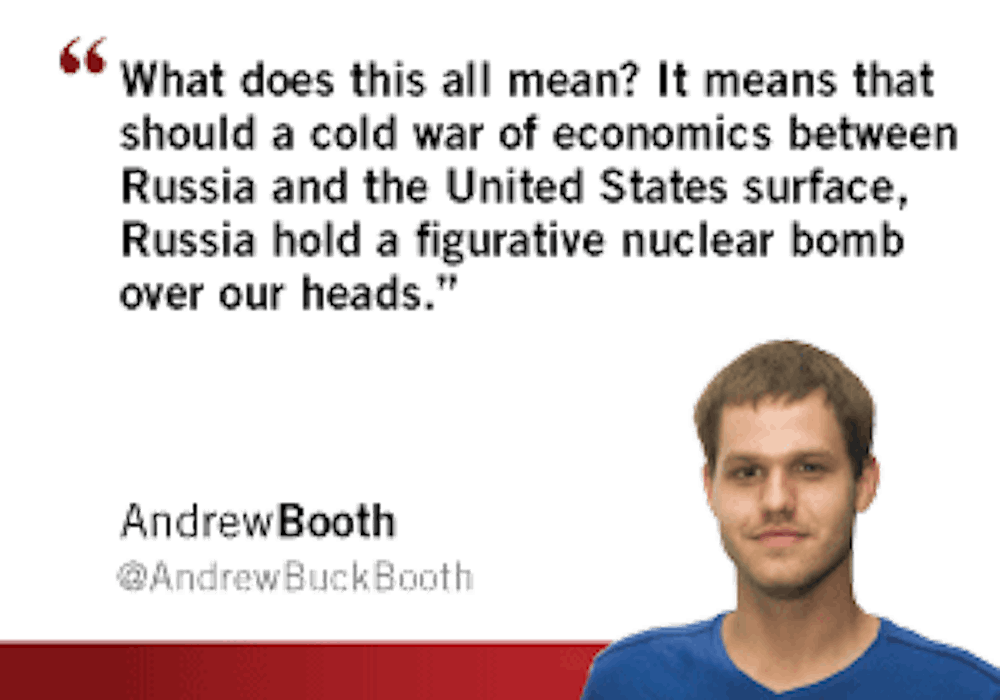In recent months, the U.S. government has been flexing its economic muscle by imposing sanctions upon Russia and attempting to end the civil war in Ukraine by forcing Russia to relinquish claims to Crimea. However, the success record of imposing economic sanctions to achieve bloodless victories has been rather shaky; our actions against countries like Cuba and Iran have had seemingly negligible effects and potentially have done us more harm than it has them. I don’t believe that we still have the stability, prosperity or influence required to collapse economies without a large risk of bringing down ours in the process, especially when attempting to do so with another superpower like Russia.
The looming issue is that any countries bold enough to break the trend and refuse to accept U.S. dollars or simply accept any currency would be threatening the economic well-being of the U.S. Here enters Russia. Russia has been developing economic ties left and right and, along with Brazil, India, China, and South Africa has created an international bank, the BRICS bank, to compete with the western international banking organizations, the IMF and World Bank. At the beginning of the conflict in Ukraine, Russia, who is the leading gas and oil supplier of Europe, threatened to end offering oil and gas transactions in the U.S. dollar.
In order to better understand the situation, we must look to history.
After the ravages of World War I, it was apparent to European governments that they could no longer compete with American industries. By the time of World War II, the U.S. was not only a military superpower, but an economic and industrial superpower as well.
After the outbreak of World War II, the U.S. began selling war necessities to the Allied countries in exchange for gold and minerals until we ended our policy of non-interventionism by passing the Lend-Lease Act, after which the aforementioned goods were given away or sold at pennies on the dollar.
While the war raged, the Bretton Woods Conference was held; this birthed today's international economic institutions and, due to the flexing of the U.S., our currency became the worlds' reserve. Under this system, each foreign currency was pegged to the U.S. dollar at a fixed exchange rate while the U.S. dollar was fixed to gold. In effect, the U.S. Federal Reserve then became the printer of international gold slips in the form of the U.S. dollar. The system worked well until the countries damaged by World War II began to recover and exchange their U.S. dollars for physical gold while the U.S. was struggling financially due to the costs of the Vietnam War and Lyndon Johnson's Great Society.
In attempts to alleviate this, Nixon unpegged the U.S. dollar from gold and, in doing so, forced the entire world into a fiat currency system with a free-floating exchange rate. This resulted in stagflation due to a flood of U.S. currency being repatriated to the U.S. economy. In 1974, then Secretary of State, Henry Kissinger, devised a plan to solve this by keeping U.S. dollars overseas: the petrodollar. Kissinger struck a deal with the Saudi royal family, which soon expanded to all OPEC members, to provide military protection and armaments in exchange for them selling oil exclusively in U.S. dollars. The only countries since to have seriously threatened this system have been Saddam Hussein's Iraq circa 2000, and Libya in 2011, under Muammar al-Gaddafi.
What does this all mean? It means that should a cold war of economics between Russia and the U.S. surface, Russia hold a figurative nuclear bomb over our heads. They could collapse the U.S. dollar by offering oil and gas sales in different currencies. This is because the reserve U.S. currency overseas, which was recently bolstered by QE2, would instantly become pointless to hold on to. Luckily, Putin has not pushed the issue; the closest it has gotten to such was disallowing American-based credit companies within Russia. This is why I fear the U.S. government's bold moves of economically pressuring Russia; it is a country in a position to potentially collapse our currency and offer a quick alternative, produced by the BRICS bank. My sentiment is that our government needs to quickly find a solution to the troubles in Ukraine and respect that Russia still has some cards to play. For I fear if we don't, we'll go the route of the USSR compounded with the troubles of Zimbabwe.
Reach the columnist at abbooth1@asu.edu or follow him on Twitter @AndrewBuckBooth
Editor’s note: The opinions presented in this column are the author’s and do not imply any endorsement from The State Press or its editors.
Want to join the conversation? Send an email to opiniondesk.statepress@gmail.com. Keep letters under 300 words and be sure to include your university affiliation. Anonymity will not be granted.





